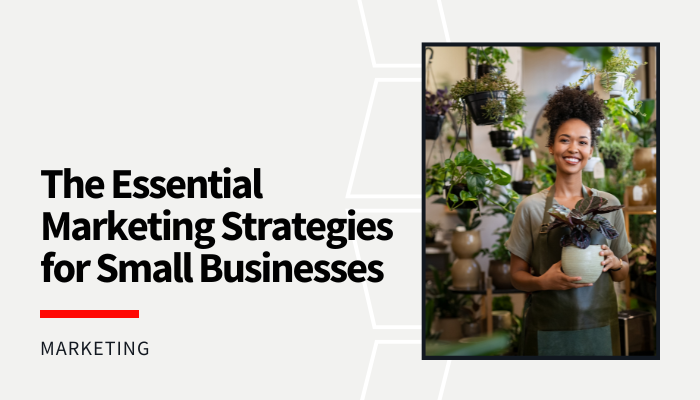Background
Running a small business is no easy feat. One of the most crucial aspects of your success lies in your marketing efforts. Whether you’re new to the game or looking to refine your strategy, these essential marketing tactics can help you thrive.
The essential marketing strategies for small businesses are:
- Understand Your Audience
- Build a Strong Online Presence
- Utilize Social Media Effectively
- Invest in Local SEO
- Leverage Email Marketing
- Network Through Community Involvement
- Utilize Content Marketing
- Pay-Per-Click (PPC) Advertising
- Track and Measure Your Results
- Seek Professional Help
Essential Marketing Strategies for Small Businesses
1. Understand Your Audience
First things first, you need to know who you’re marketing to. Dive deep into understanding your target audience. What are their needs, preferences, and behaviors?
Creating detailed buyer personas allows you to tailor your marketing efforts to resonate with your ideal customers. A Phoenix marketer can help you gather and analyze this data for a clearer picture.
2. Build a Strong Online Presence
Your online presence is often the first interaction potential customers have with your business.
Ensure your website is user-friendly, mobile-optimized, and informative. Engage with visitors through regular blog posts, FAQs, and easy navigation. A marketing consultant can guide you in setting up and maintaining a robust website.
3. Utilize Social Media Effectively
Social media platforms are powerful tools for small businesses. Identify which platforms your audience frequents the most and focus your efforts there.
Create engaging content that speaks to your audience, whether it’s Facebook, Instagram, Twitter, or LinkedIn. Don’t shy away from using live videos, stories, and interactive posts to keep your audience hooked.
4. Invest in Local SEO
Local search engine optimization (SEO) is crucial for small businesses looking to attract customers in their vicinity. Optimize your website for local search terms and ensure your business is listed on Google My Business. Regularly update your listings with current information, including your address, phone number, and operating hours. An experienced marketing operations specialist can help you navigate the complexities of local SEO.
5. Leverage Email Marketing
Email marketing remains highly effective despite being one of the oldest digital marketing strategies. Collect email addresses from your customers and send them regular updates, promotions, and personalized content.
Make sure your emails are mobile-friendly and provide value to the readers. A well-planned email marketing campaign can significantly boost your engagement and sales.
6. Network Through Community Involvement
Engaging with your local community can do wonders for your business reputation. Participate in local events, sponsor community activities, or collaborate with other local businesses. This not only increases your visibility but also builds trust and loyalty among local customers.
7. Utilize Content Marketing
Content is king, as they say. Creating valuable, relevant, and consistent content can attract and retain a clearly defined audience. This includes blog posts, videos, infographics, and podcasts.
High-quality content boosts your SEO efforts and positions your business as an authority in your industry.
8. Pay-Per-Click (PPC) Advertising
If you’re looking for quick results, PPC advertising is a viable option. Platforms like Google Ads and Facebook Ads allow you to target specific demographics with precision. Although it requires a budget, the return on investment can be significant if managed properly.
Consider hiring a marketing operations specialist to ensure your campaigns are optimized for the best results.
9. Track and Measure Your Results
You can’t improve what you don’t measure.
Regularly track the performance of your marketing efforts using tools like Google Analytics, social media insights, and email marketing reports. Analyze this data to understand what’s working and what’s not. Adjust your strategies accordingly to maximize your marketing ROI.
10. Seek Professional Help
Sometimes, navigating the complex world of marketing can be overwhelming. Don’t hesitate to seek help from professionals like a marketing consultant or a Phoenix marketer. Their expertise can provide you with tailored strategies that align with your business goals and help you stay ahead of the competition.
Conclusion
Implementing these essential marketing strategies can lead your small business to success. Remember, marketing is not a one-size-fits-all approach. It requires continuous effort, adaptation, and a deep understanding of your audience.
Whether you’re working with a marketing consultant or a marketing operations specialist, these tactics can help you create a solid foundation for your business growth.
FAQs
Q1: What is the role of a marketing consultant for small businesses?
A marketing consultant helps small businesses develop and implement effective marketing strategies to reach their target audience and achieve their business goals.
Q2: How can a Phoenix marketer assist in local SEO?
A Phoenix marketer specializes in understanding the local market dynamics and can optimize your online presence to attract local customers through tailored SEO strategies.
Q3: What are the benefits of hiring a marketing operations specialist?
A marketing operations specialist can streamline your marketing processes, optimize your campaigns, and ensure that your marketing efforts are efficient and effective.
Q4: Why is email marketing still relevant today?
Email marketing remains relevant because it allows businesses to reach customers directly with personalized content, promotions, and updates, leading to higher engagement and conversions.
Q5: How can content marketing improve my business’s online presence?
Content marketing boosts your online presence by providing valuable and relevant content that attracts and retains your target audience, enhances SEO, and positions your business as an industry authority.
About Justin Bahr Marketing & Photography
Justin Bahr Marketing & Photography specializes in delivering exceptional marketing solutions and professional photography services tailored to meet the unique needs of businesses and individuals. With expertise in branding, web design, and headshot photography, Justin helps small businesses grow their online presence while capturing high-quality visuals that tell their story. Whether you’re seeking creative marketing strategies or timeless imagery, Justin Bahr is dedicated to providing a personalized, results-driven experience that exceeds expectations. Based in Phoenix, Arizona Justin serves clients locally and nationwide, helping them achieve their goals with precision and creativity.



